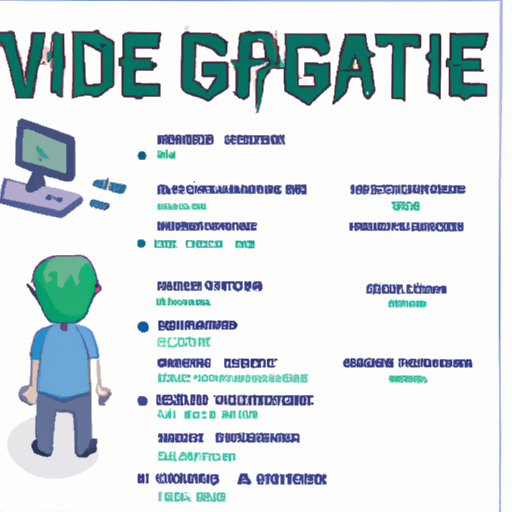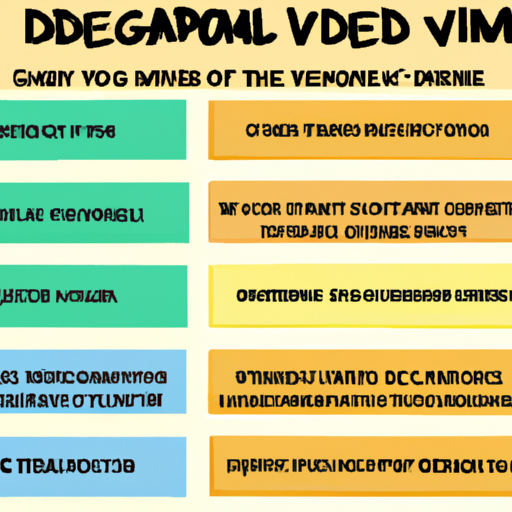The field of video game development has grown rapidly over the years, captivating millions of individuals with its immersive and interactive gameplay experiences. Behind every successful video game lies a team of talented and innovative developers who bring these virtual worlds to life. In this article, we will delve into the intricate details of the video game developer job description. From the necessary skills and qualifications to the key responsibilities and challenges, we aim to provide a comprehensive overview of what it takes to become a video game developer in this highly competitive industry. Whether you are an aspiring developer or simply intrigued by the inner workings of the gaming world, this article will equip you with the necessary knowledge to navigate the exciting realm of video game development.
Table of Contents
- Job Overview: Video Game Developer
- Responsibilities: Designing and Developing Game Concepts
- Qualifications: Skills and Educational Background Needed
- Collaboration: Working with Designers, Artists, and Programmers
- Technical Expertise: Proficiency in Programming Languages and Tools
- Testing and Debugging: Ensuring Quality and Performance
- Problem-Solving: Analyzing and Resolving Technical Challenges
- Continued Learning: Staying Updated with Industry Trends and Technologies
- Career Development: Opportunities for Advancement and Growth
- Concluding Remarks

Job Overview: Video Game Developer
As a video game developer, you will be responsible for creating and coding interactive gaming experiences that captivate and engage players. Your role will involve collaborating with a team of talented artists, designers, and programmers to bring game concepts to life. Using your expertise in programming languages such as C++, Java, or Python, you will develop and implement game mechanics, user interfaces, and gameplay features.
In addition to coding, you will participate in brainstorming sessions to generate innovative ideas for game development. You will also conduct thorough testing and debugging to ensure the functionality of the game, solving potential technical issues and optimizing performance. As a video game developer, you will stay abreast of emerging technologies and industry trends, continuously expanding your knowledge and skills to deliver high-quality games that ignite the imagination of players around the world.

Responsibilities: Designing and Developing Game Concepts
As a video game developer, one of your key responsibilities will be designing and developing game concepts. This involves using your creativity and technical skills to bring unique and engaging game ideas to life. You will work closely with a team of artists, programmers, and designers to create compelling game experiences that captivate players.
In this role, you will be tasked with brainstorming and pitching game concepts, taking into account factors such as target audience, market trends, and gameplay mechanics. You will utilize your expertise in game design principles to create detailed concept documents, outlining the game’s objectives, storylines, character development, and level design. Your creative vision will shape the overall aesthetic and feel of the game, making it visually appealing and immersive for players.

Qualifications: Skills and Educational Background Needed
To excel as a video game developer and contribute to the creation of immersive virtual worlds, candidates must possess a set of essential skills and a suitable educational background. A deep understanding of computer programming languages, such as C++, Java, or Python, is vital to bring game concepts to life. Proficiency in software development environments like Unity or Unreal Engine is also crucial, as these tools facilitate the design, coding, and debugging processes.
Furthermore, a solid foundation in mathematics and physics empowers developers to tackle complex challenges and accurately simulate realistic game mechanics. Problem-solving and analytical thinking skills are highly valued in this field, as they enable creative troubleshooting and efficient bug fixing. Effective communication and collaboration skills are an added advantage, since video game development often involves working in interdisciplinary teams where clear articulation of ideas is essential for seamless coordination.
Collaboration: Working with Designers, Artists, and Programmers
A successful video game developer job requires the seamless collaboration of designers, artists, and programmers. Each of these roles brings a unique skill set to the table, allowing for the creation of captivating gaming experiences. Designers play a crucial role in conceptualizing game mechanics, level layout, and user experience. They are responsible for creating engaging gameplay systems, puzzle structures, and overall game flow. By collaborating closely with artists, they ensure that the visual elements of the game align with the design vision, creating a cohesive and immersive world for players to explore.
Working alongside designers, artists lend their creative prowess to bring life to the game through visual aesthetics. They are responsible for crafting visually stunning environments, characters, props, and animations. Using their mastery of various artistic techniques and digital tools, artists design captivating visuals that enhance the player’s experience. By skillfully combining color theory, texturing, and lighting, they create breathtaking landscapes and lifelike characters that draw players into the game world.
Additionally, the collaboration between designers and programmers ensures that the game mechanics are translated into functional code. Programmers bring the game to life by coding various components, such as AI behaviors, physics simulations, and user interfaces. They optimize the performance of the game, ensuring smooth gameplay and a seamless user experience. By collaborating with both designers and artists, programmers integrate the visual and design elements into the code, ensuring that the game not only looks stunning, but also functions flawlessly.
Technical Expertise: Proficiency in Programming Languages and Tools
HTML Expertise:
– Strong knowledge of HTML5 and CSS3, ensuring visually appealing and user-friendly interfaces for video games.
– Proficient in creating responsive designs that adapt seamlessly to different screen sizes and resolutions.
– Familiarity with HTML frameworks and libraries like Bootstrap, Foundation, and Materialize, enabling efficient development and enhanced functionality.
Programming Languages:
– Extensive experience in programming languages such as C++, Java, and Python, essential for the development of robust and efficient gameplay systems.
- Excellent understanding of object-oriented programming (OOP) principles, facilitating the creation of modular and reusable code that promotes scalability and maintainability.
– Proficient in scripting languages like JavaScript, Lua, and TypeScript, enabling the implementation of complex game logic and interactive elements.
Development Tools:
– Expertise in using industry-standard integrated development environments (IDEs) such as Unity, Unreal Engine, and Visual Studio, providing a seamless development experience across various platforms.
– Good understanding of version control systems like Git and Subversion, ensuring efficient teamwork, code collaboration, and project management.
– Familiarity with debugging tools and profilers, allowing for thorough troubleshooting, performance optimization, and bug fixes to ensure an exceptional gaming experience.
Testing and Debugging: Ensuring Quality and Performance
Video game development is a complex and intricate process that requires a keen eye for detail and a passion for ensuring quality and performance. As a video game developer, testing and debugging become pivotal tasks in your job description. By thoroughly testing every aspect of the game, you play a vital role in ensuring that players have a seamless and immersive experience.
One of the primary responsibilities of a video game developer is to identify and resolve any bugs or glitches that may arise during the development stages. This can include issues with gameplay mechanics, collision detection, graphical artifacts, or even game crashes. Through meticulous testing and debugging, you are able to eliminate these obstacles before the game reaches the hands of eager players. Utilizing various testing tools and techniques, such as unit testing, regression testing, and exploratory testing, allows you to analyze different aspects of the game’s functionality and identify potential issues. By leveraging your expertise and attention to detail, you can work closely with the development team to address these concerns promptly and effectively, ensuring that the game runs smoothly and meets the highest quality standards.
Problem-Solving: Analyzing and Resolving Technical Challenges
****
Video game developers hold a crucial role in today’s ever-growing gaming industry. As part of their job description, they are tasked with continuously analyzing and resolving technical challenges that arise during the game development process. This essential problem-solving skill set allows them to ensure that the game functions smoothly, effectively captivating players and delivering an unparalleled gaming experience.
In their day-to-day activities, video game developers utilize their expertise in programming languages, software development, and game design principles. They are proficient in identifying and addressing complex technical issues that may arise throughout different stages of game development. Whether it’s debugging faulty code, optimizing game performance, or troubleshooting compatibility problems, these talented professionals are adept at thinking critically and offering creative solutions to overcome these technical hurdles. Their meticulous approach to analyzing problems and implementing effective resolutions is essential in delivering high-quality, bug-free games that meet the expectations of both players and industry standards.
Continued Learning: Staying Updated with Industry Trends and Technologies
The ever-evolving landscape of the video game industry necessitates that video game developers possess a thirst for continued learning. Staying updated with industry trends and technologies is not only a desirable trait for developers, but it is also vital for their success in this competitive field. By actively engaging in ongoing learning, developers can ensure they remain at the forefront of the industry’s advancements and maintain their ability to deliver innovative gaming experiences.
One way developers can stay updated is by regularly attending industry conferences and events. These gatherings offer invaluable opportunities to connect with like-minded professionals, gain insights from industry experts, and discover the latest trends and technologies shaping the gaming world. Additionally, joining relevant online communities and forums allows developers to engage in discussions with peers, exchange ideas, and stay informed about emerging trends. Podcasts and webinars hosted by experts in the field can also provide valuable insights in a convenient and accessible manner. Embracing a mindset of continuous learning through these various avenues empowers video game developers to refine their skills, adapt to industry developments, and ensure their work remains relevant and competitive in an ever-changing landscape.
Career Development: Opportunities for Advancement and Growth
In the exciting world of video game development, there are endless opportunities for advancement and personal growth. As a video game developer, you will be at the forefront of creating immersive digital experiences that captivate audiences around the globe. With each project, you will have the chance to expand your skill set, refine your creative abilities, and push boundaries in the ever-evolving landscape of gaming.
Working as a video game developer, you will embark on a dynamic career path that offers a multitude of avenues for progression. Whether it’s specializing in a particular aspect of game development such as character design, level creation, or audio engineering, or taking on leadership roles as a team lead or project manager, there is no limit to the potential growth you can achieve. Additionally, the video game industry is known for its collaborative nature, providing ample opportunities to collaborate with experts from various disciplines and learn from their expertise, further enhancing your own abilities.
Concluding Remarks
In conclusion, the role of a video game developer is both challenging and rewarding. This article has provided a comprehensive overview of the job description, responsibilities, and essential skills required for aspiring developers in the industry. From designing intricate game worlds to coding complex algorithms, developers play a vital role in shaping the immersive gaming experiences enjoyed by millions worldwide.
As the demand for innovative and captivating video games continues to soar, the skills and qualifications needed for this profession are evolving. With a strong foundation in programming languages and a passion for gaming, individuals can embark on a fulfilling career as a video game developer.
Considering the dynamic nature of the gaming industry, developers must adapt to new technologies, hone their creative abilities, and collaborate effectively with colleagues from various disciplines. The ever-changing landscape presents an opportunity for developers to continually learn, grow, and push the boundaries of game development.
Whether you aspire to join an established game studio or launch your own indie game, it is crucial to develop a diverse skillset that encompasses programming, design, and problem-solving. By staying abreast of industry trends and acquiring hands-on experience, prospective developers can navigate the competitive landscape and create games that resonate with audiences across the globe.
In conclusion, a career as a video game developer holds immense potential for those passionate about gaming and technology. It offers the chance to bring imaginations to life, shape virtual worlds, and leave a lasting impact on the gaming community. So, if you have the drive and determination to pursue this exciting path, seize the opportunity, embark on this exhilarating journey, and help shape the future of gaming.
